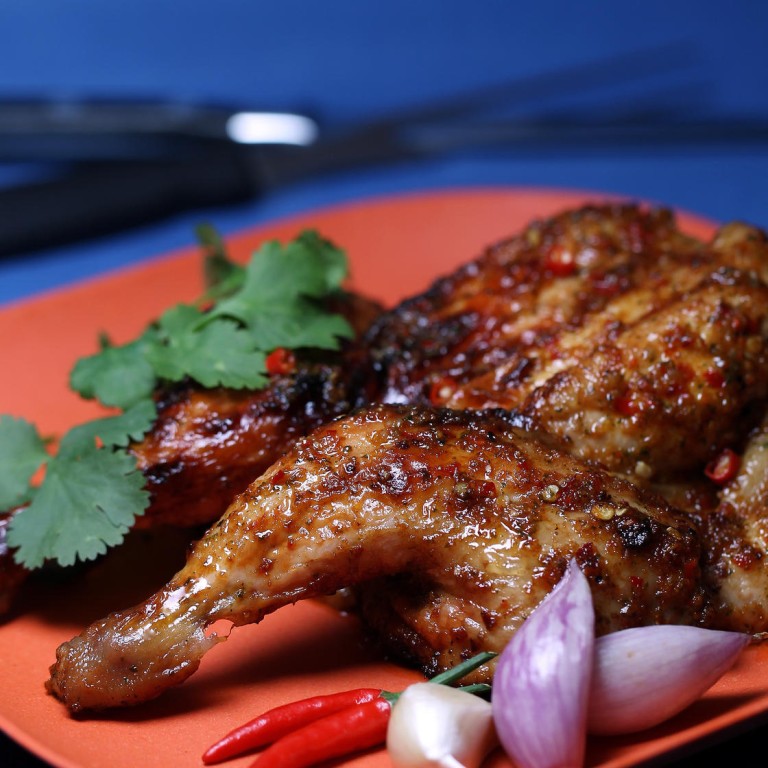
Barbecue recipes: for chicken, and balsamic duck breast
It's barbecue season and a perfect opportunity to go back to our culinary caveman roots
Barbecuing food over a fire (or directly in the flames) is primal - it was almost certainly the first cooking method our ancestors used, even though it was more than likely an accidental discovery. Cavemen probably wouldn't have bothered with the nuances offered by various types of hardwood or charcoal briquette, or have dwelled on the subtle smokiness imbued into food by the addition of a rosemary branch or dried grapevine. You don't need all that, either, but it is worth seeking out good-quality charcoal, because it burns better than the cheap stuff. These two recipes each feed two, but, of course, the ingredients can be increased to feed as many as you like.
Buy the chicken the day before you want to cook it, so you have time to salt and marinate it.
1 small chicken (about 1.2kg)
2 shallots
2 large garlic cloves
1-2 red bird's-eye chillies
¼ tsp cayenne pepper, or to taste
1/3 tsp paprika, or to taste
1/3 tsp dried oregano, or to taste
50ml olive oil
20ml fresh lime juice
20ml maple syrup
Fine sea salt
Cooking oil, for brushing the grill rack
Lime wedges, for serving
Cut the chicken into pieces, so you have two breasts (boneless), thighs, drumsticks and wings, and one lower back (reserve the neck, feet, wing tips and upper back to make stock). Lay the pieces on a cutting board and season them lightly with salt, then put them in a ziplock bag and refrigerate overnight.
Peel and roughly chop the shallots and garlic cloves. Slit the chilli lengthwise, then use a small spoon to scrape out the seeds. Roughly chop the chilli. Put the shallot, garlic, chilli, cayenne pepper, paprika and oregano in a food processor (or blender), add half a teaspoon of salt and process until the aromatics are in small pieces. With the motor running, add the olive oil through the feed tube in a slow, steady stream, so the mixture creates an emulsion. Scrape the bowl of the food processor (or blender), then, with the motor running, pour in the lime juice and maple syrup through the feed tube. Put the chicken pieces into a large mixing bowl, add the marinade and mix thoroughly. Transfer the chicken back into the sealable bag and refrigerate for at least six hours.
Heat the charcoal for the barbecue about an hour before it's time to cook, then lightly brush the grill rack with oil. Barbecue the chicken pieces on the covered grill for about 10 to 20 minutes, depending on the size and thickness (the breasts take less time). Turn the pieces as needed and rearrange them occasionally so they cook evenly, letting the skin char slightly. Squeeze fresh lime juice over the chicken just before eating it.
Barbecuing a duck breast can be exciting if you're a pyromaniac because if the fat drips down onto the coals it can cause flames to flare up. You need to build the fire carefully so the coals are on the sides of the grill, which means the duck isn't cooking directly over the fire. Put a metal pan of water in the base of the barbecue (with the coals around it), so the fat dripping into the water creates steam, which will also help the meat to cook.
Use good-quality balsamic vinegar that's been aged for about 12 years. You don't need the really expensive balsamic (the kind that's aged 25 years or more would be wasted on this dish), but at the same time you don't want the really cheap stuff, because the flavour is far too acidic.
Score the skin of the duck breasts in a diamond pattern, taking care not to cut into the flesh. Mix the balsamic vinegar with the onion, honey, lemon juice, olive oil and a sprinkling of salt. Rub this mixture into the skin and flesh and refrigerate for several hours. Remove the duck breasts from the fridge about an hour before cooking. Dry them with paper towels. Season the skin and flesh with salt and pepper, and rub the seasonings into the meat.
Heat the charcoal for the barbecue about an hour before it's time to cook. Push the coals to the sides, back and front of the grill, leaving a space in the centre that's about 12cm by 12cm. Put a pan of water in the space, then lay the grill racks in place and lightly brush them with oil. When the fire is very hot, lay the duck breasts, skin-side down, on the grill, then cover with the lid and cook for about eight to 10 minutes (for medium-rare). Put the duck breasts skin-side up directly over the hot coals and sear on one side, then turn the pieces over and grill over the direct heat, to lightly char the skin. Place the breasts skin-side up on a cutting board and leave to rest for about five minutes before slicing against the grain.

